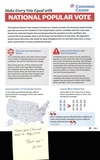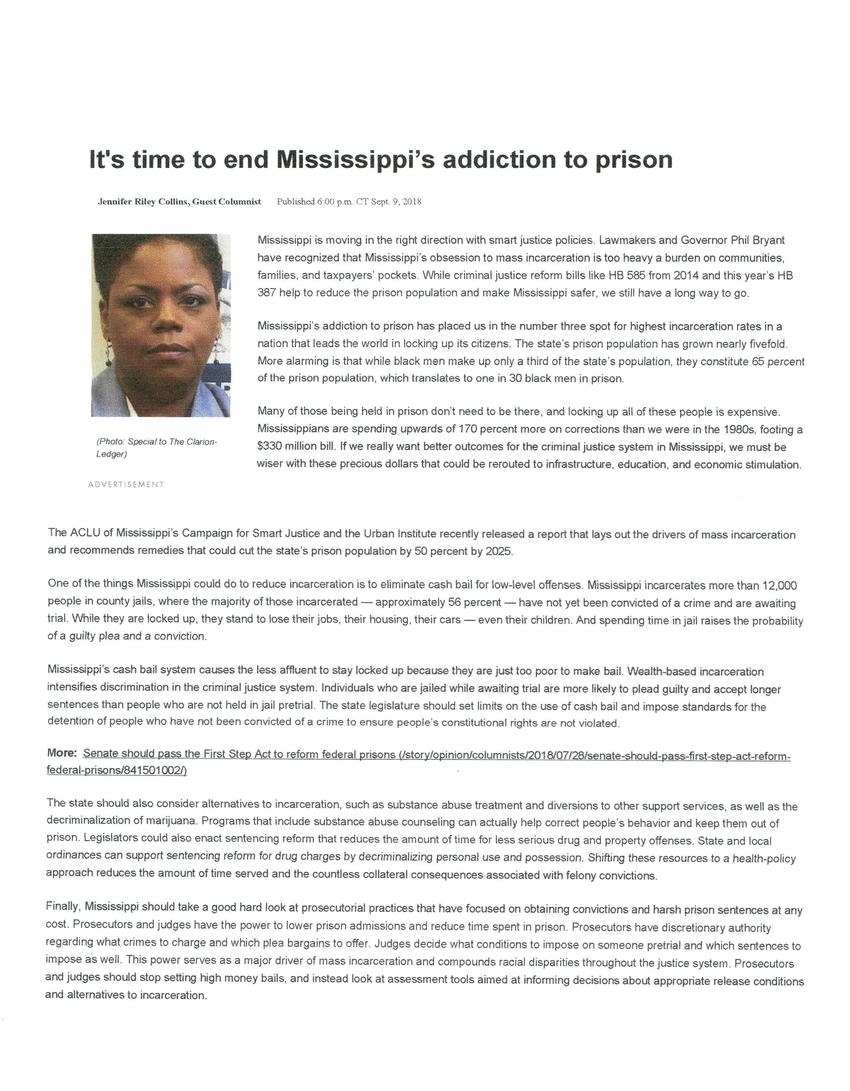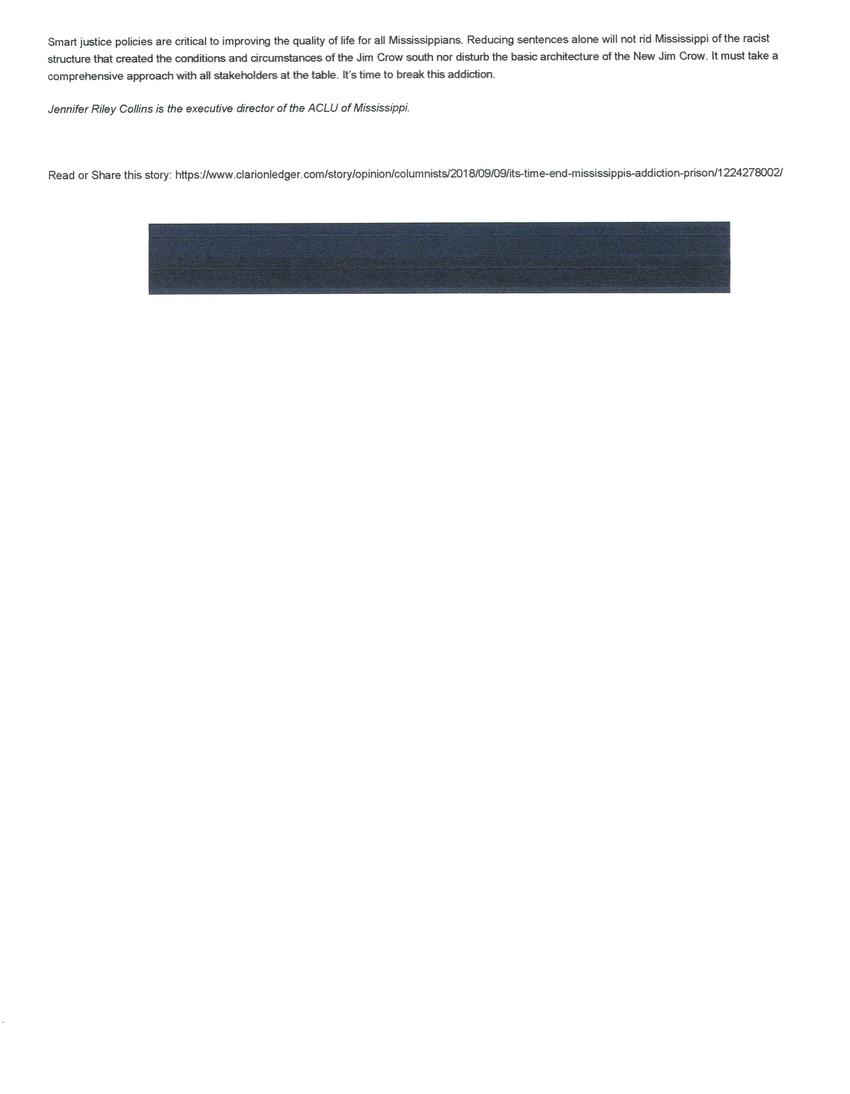
Transcription
https://www.clarionledger.com/story/opinion/columnists/2018/09/09/its-time-end-mississippis-addiction-prison/1224278002/
It's time to end Mississippi’s addiction to prison
Jennifer Riley Collins, Guest Columnist
Published 6:00 p.m. CT Sept. 9, 2018
Mississippi is moving in the right direction with smart justice policies. Lawmakers and Governor Phil Bryant have recognized that Mississippi’s obsession to mass incarceration is too heavy a burden on communities, families, and taxpayers’ pockets. While criminal justice reform bills like HB 585 from 2014 and this year’s HB 387 help to reduce the prison population and make Mississippi safer, we still have a long way to go.
Mississippi’s addiction to prison has placed us in the number three spot for highest incarceration rates in a nation that leads the world in locking up its citizens. The state’s prison population has grown nearly fivefold. More alarming is that while black men make up only a third of the state’s population, they constitute 65 percent of the prison population, which translates to one in 30 black men in prison.
Many of those being held in prison don’t need to be there, and locking up all of these people is expensive. Mississippians are spending upwards of 170 percent more on corrections than we were in the 1980s, footing a $330 million bill. If we really want better outcomes for the criminal justice system in Mississippi, we must be wiser with these precious dollars that could be rerouted to infrastructure, education, and economic stimulation.
The ACLU of Mississippi’s Campaign for Smart Justice and the Urban Institute recently released a report that lays out the drivers of mass incarceration and recommends remedies that could cut the state’s prison population by 50 percent by 2025.
One of the things Mississippi could do to reduce incarceration is to eliminate cash bail for low-level offenses. Mississippi incarcerates more than 12,000 people in county jails, where the majority of those incarcerated — approximately 56 percent — have not yet been convicted of a crime and are awaiting trial. While they are locked up, they stand to lose their jobs, their housing, their cars — even their children. And spending time in jail raises the probability of a guilty plea and a conviction.
Mississippi’s cash bail system causes the less affluent to stay locked up because they are just too poor to make bail. Wealth-based incarceration intensifies discrimination in the criminal justice system. Individuals who are jailed while awaiting trial are more likely to plead guilty and accept longer sentences than people who are not held in jail pretrial. The state legislature should set limits on the use of cash bail and impose standards for the detention of people who have not been convicted of a crime to ensure people’s constitutional rights are not violated.
More: Senate should pass the First Step Act to reform federal prisons
The state should also consider alternatives to incarceration, such as substance abuse treatment and diversions to other support services, as well as the decriminalization of marijuana. Programs that include substance abuse counseling can actually help correct people’s behavior and keep them out of prison. Legislators could also enact sentencing reform that reduces the amount of time for less serious drug and property offenses. State and local ordinances can support sentencing reform for drug charges by decriminalizing personal use and possession. Shifting these resources to a health-policy approach reduces the amount of time served and the countless collateral consequences associated with felony convictions.
Finally, Mississippi should take a good hard look at prosecutorial practices that have focused on obtaining convictions and harsh prison sentences at any cost. Prosecutors and judges have the power to lower prison admissions and reduce time spent in prison. Prosecutors have discretionary authority regarding what crimes to charge and which plea bargains to offer. Judges decide what conditions to impose on someone pretrial and which sentences to impose as well. This power serves as a major driver of mass incarceration and compounds racial disparities throughout the justice system. Prosecutors and judges should stop setting high money bails, and instead look at assessment tools aimed at informing decisions about appropriate release conditions and alternatives to incarceration.
Smart justice policies are critical to improving the quality of life for all Mississippians. Reducing sentences alone will not rid Mississippi of the racist structure that created the conditions and circumstances of the Jim Crow south nor disturb the basic architecture of the New Jim Crow. It must take a comprehensive approach with all stakeholders at the table. It’s time to break this addiction.
Jennifer Riley Collins is the executive director of the ACLU of Mississippi.
Other posts by this author
|
2023 may 31

|
2023 mar 20

|
2022 aug 23

|
2022 aug 23

|
2022 aug 23

|
2022 aug 23

|
More... |



Replies